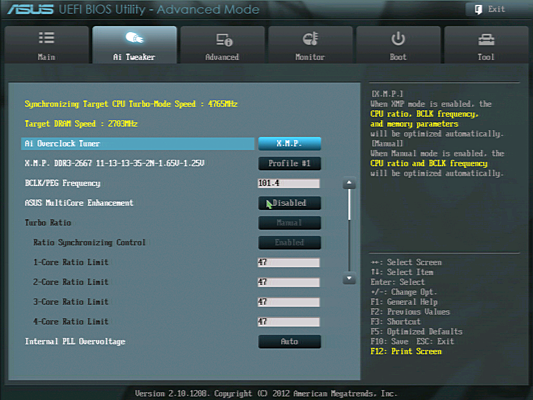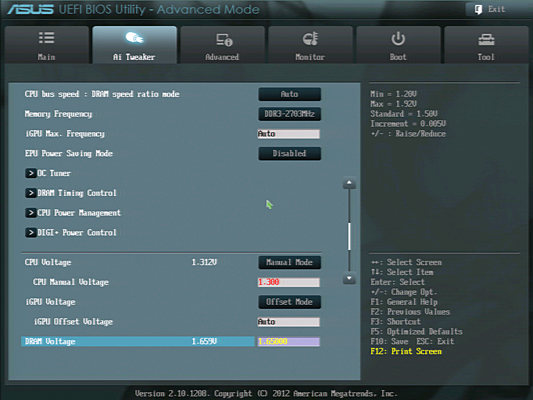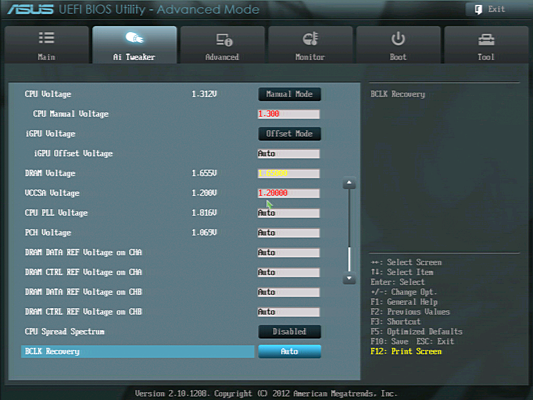Six $160-220 Z77 Motherboards, Benchmarked And Reviewed
Combining the newest features with moderate expandability, Intel’s mainstream platforms provide high value to most gaming and overclocking enthusiasts. We compare six examples with Z77 Express to find the best features, overclocking, and efficiency.
P8Z77-V Pro Firmware
The P8Z77-V Pro pushed our Core i7-3770K to 4.77 GHz at 1.30 V using a 101.4 MHz base clock and 47x core multiplier. We began our overclock at A.I. Tuner’s X.M.P. overclocking mode, rather than using purely manual or Asus-defined overclock settings.
Shown at DDR3-2703, the P8Z77-V Pro pushed a stable DDR3-2715 from G.Skill’s DDR3-2666 when a lower CPU multiplier was used.
Red warnings tell us that 1.30 V core and 1.20 V System Agent voltage levels are higher than suggested for Ivy Bridge, though some of our engineering friends advise otherwise. We asked many questions before choosing these settings, but only time can prove the adequacy of this advice.
Primary, secondary, and tertiary timings are all found within Ai Tweaker’s DRAM Timing Control submenu.
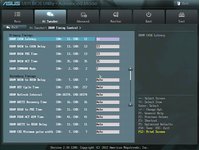
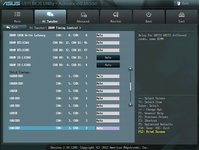
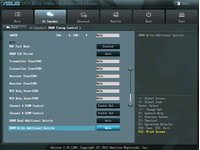
The CPU Power Management menu also provides the actual multiplier control for fixed mode, along with several current limits. Asus says that Automatic power settings are more than adequate for all but the most aggressive overclockers, and we never encountered a power reset or lock-up by using these.
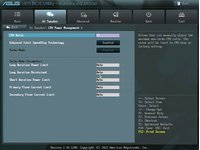
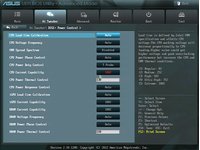
Load-line calibration could be the most important feature of Asus’ Digi+ Power Control submenu. We were pleasantly surprised to find that Auto settings kept our CPU core voltage stable under various load conditions.
Get Tom's Hardware's best news and in-depth reviews, straight to your inbox.
-
yougotjaked There's a typo on the last page. It says X77H2-A2X instead of Z77H2-A2X :P It's on the second to last paragraph...Reply -
HMSvictory I am surprised that you guys did not include the Asus z77-VReply
http://www.newegg.com/Product/Product.aspx?Item=N82E16813131820 -
confish21 One thing i was looking for was the part about asrock not having true "digital" PWM and going with an analog PWM. Does this really matter?Reply -
Crashman TekN9NeGreat review! At the end of day, it comes down to brand loyalty.I don't think the article stated anything like that. It comes down to the features you want and the cards you plan to use. In the MSI vs ASRock debate, it's x8-x4-x4 with all three slots in PCIe 3.0 mode, or x8-x8-x4 with x4 in PCIe 2.0 mode, and you're definitely wiser to pick between them based on WHAT you plan to use in the third slot.simone saysdo you mean nvidia and intel gets news during weekends not only news but featured articles?It's Monday here, and editorial has very little contact with news.HMSvictoryI am surprised that you guys did not include the Asus z77-Vhttp://www.newegg.com/Product/Prod 6813131820Tom's Hardware didn't "include" anything in the review. A couple boards were excluded based on price, and everything else was let in. The P8Z77-V Pro was the cheapest board Asus sent.rickrentswhy not with Pci-e 3.0?Editor had no PCIe 3.0 cards. And the reason he didn't get one yet is because it didn't matter. The only thing that really mattered in a single-GPU MOTHERBOARD comparison was to use the same card on all platforms.confish21One thing i was looking for was the part about asrock not having true "digital" PWM and going with an analog PWM. Does this really matter?Some digital voltage regulators have been garbage, take a look at a few of the older reviews to see this. Very few have been very good. And many more analog voltage regulators have been garbage, while many more analog voltage regulators have been very good. Quality of execution is more important than the underlying technology.Reply
